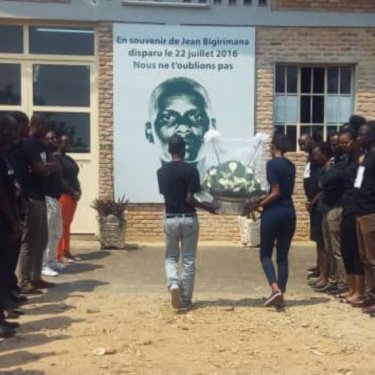Three years after Burundian journalist’s disappearance, RSF calls for DNA tests

The Burundian authorities continue to show no interest in solving the disappearance of Jean Bigirimana, an investigative reporter for the independent news website Iwacu who went missing exactly three years ago. Reporters Without Borders (RSF) urges them to carry out DNA tests on two bodies that were found shortly after his disappearance.
In the three years since Bigirimana disappeared on 22 July 2016, the investigation has been marked by an absence of transparency and inaction. He was last seen in the custody of members of the National Intelligence Service (SNR) in Muramvya, 45 km east of the capital, Bujumbura.
So far, the best clues to his fate have come from the investigation that his Iwacu colleagues managed to carry out although the authorities did their best to intimidate and obstruct them. A few weeks after his disappearance, they found two badly decomposed bodies in a river near to where he was seen for the last time. One had no head.
After recovering the bodies, the authorities summoned Bigirimana’s wife but she was unable to identify either as her husband’s body. The two bodies were then quickly buried without any DNA tests being conducted.
“It is unacceptable that, three years after Jean Bigirimana’s disappearance, the investigation has ground to a complete halt although there is at least one serious lead that has not been fully explored,” said Arnaud Froger, the head of RSF’s Africa desk. “The few minutes that his wife spent trying to identify the two discovered bodies did not suffice to rule out the possibility that one of them was Bigirimana’s. They were in a very bad state and one had been beheaded. We urge the Burundian authorities to order a formal identification of the bodies using forensic methods. Only DNA tests will be able to establish with certainty whether or not one of them is Bigirimana’s.”
One of the few independent media outlets to have survived the crackdown that followed a coup attempt in May 2015, Iwacu is often harassed by the authorities and its editor was forced to flee abroad for safety reasons. Access to the website was blocked in October 2017, and was only unblocked after RSF intervened.
Just two weeks ago, Iwacu was accused by Burundi’s media regulator of publishing unbalanced information and slander, suggesting that it could be sanctioned in the near future. With a year to go to the next presidential election, most of Burundi’s independent media are either threatened or already sanctioned.
Burundi is ranked 159th out of 180 countries in RSF’s 2019 World Press Freedom Index.


